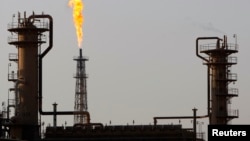Iraqi government forces made significant advances on Wednesday in an effort to break an Islamic State siege of the country's biggest refinery just outside the city of Baiji, an army commander and state television said.
Backed by Shi'ite militias, government forces have seized 60 percent of the city center and are close to opening a corridor to Islamic State militants ringing the refinery, 200 km (130 miles) north of the capital, said the commander.
A deserted area between the edge of the city and the refinery may be difficult to cross because of roadside bombs and snipers, security officials say.
“We expect to break the siege within two days,” said the commander, who asked not to be named.
State television said the gains were a “continuation of victory” and showed soldiers being interviewed in what appeared to be the city center.
Suicide bombings and car bombs, including an attack on federal police headquarters, killed 23 people in Iraq on Wednesday, police, military and medical sources said.
Islamic State fighters swept through northern Iraq in June almost unopposed by the army, seizing the city of Baiji and surrounding the sprawling refinery.
Government forces inside the complex, who survive on airdrops, are ringed by the Sunni insurgents.
Iraqi Prime Minister Haider al-Abadi sacked 26 military commanders on Wednesday for corruption and incompetence.
“The military leadership should have competence, and this is an important thing, as it is not possible for someone who is not efficient to do his work properly,” Abadi said in comments to army officers broadcast on state television.
“The second thing is integrity, as efficiency without integrity produces a vacuum. The third is courage, so that the soldier will fight in a proper way when he sees his commander has such qualifications.”
Officials in Abadi's office were not immediately available to comment on which commanders had been removed. Iraqi media said they included the army chief of staff.
The country's most influential Shi'ite cleric, Grand Ayatollah Ali al-Sistani, said on Friday corruption in the armed forces had enabled Islamic State to seize large chunks of Iraq, in criticism that added to pressure for reforms.
Sistani has become increasingly critical of Iraqi leaders since Islamic State's advances plunged the country into crisis.
Islamic State gains and the beheading of Western hostages triggered U.S.-led air strikes which have slowed down the group in recent weeks.





